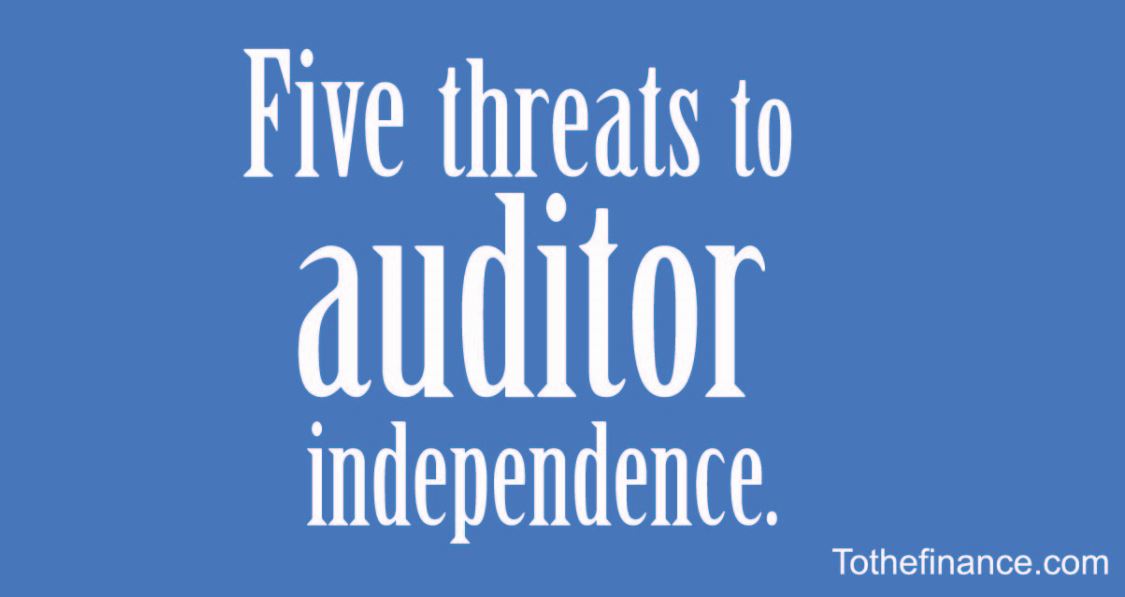Threats to auditor independence must be reviewed before engaging any audit activity. In simple words, an audit must be conducted independently of the client’s management. It is crucial for completing a thorough audit to be conduct by an independent auditor. However, a variety of possible dangers might compromise the auditor’s independence and impartiality. These threats may include, for instance, self-interest, self-review, familiarity, intimidation, and advocacy. The following are the five threats to auditor independence.
Risk of material mis-statement
1- Self-Interest Threat
This is one of the five potential threats to the auditor’s impartiality and independence. If the auditor’s interests diverge from those of the client, a conflict of interest may occur. During an audit, the auditor must consider all parties’ interests. However, auditors may also have interests in the firm or organization they are investigating. If their interests are in jeopardy, they may prioritize their requirements above those of other stakeholders.
Auditors can limit the danger of self-interest in a variety of ways. For example, any auditor who raises such dangers to a client is promptly dismissed from his or her responsibilities. If they are unable to overcome these difficulties, the auditors may need to consider terminating their participation.
2-Self-Review Threat
As a result of auditors’ close ties with their customers, there is the possibility of self-review. Some specialists provide other services in addition to auditing, which is their major competency. Some auditors, for instance, also provide accounting and tax planning services. If auditors are expected to evaluate their prior work, auditor self-review is a possibility.
For instance, auditors may provide services to prepare financial statement and carry out audit as well. In this case, it should be noted that auditor will be reviewing financial statement prepared by themselves. Hence, it will create self-review threat as they have to review their own work.
Similar to the self-interest risk, the self-review risk may be avoided. By using distinct teams for each job, auditors may avoid double-checking their work. If they cannot bear the stress of their self-evaluation, they will be forced to terminate the relationship.
3-Familiarity Threat
Similarly, there may be a danger of familiarity owing to the close working connection between auditors and clients. Long-term client-auditor relationships may result in auditors having excessive knowledge of a client’s management. The likelihood that familiarity may imperil the engagement is proportional to the length of time the parties have known one another.
The familiarity hazard is an additional potential threat that must be avoided. Auditors may prevent this by avoiding long-term customer connections and often shifting the audit team’s members. There are a variety of other familiarity threats and preventative strategies.
4-Intimidation Threat
Another risk auditors face is s direct client threats. When the customer has any kind of influence on the auditors, these risks often emerge. In this situation, the customer can threaten the auditor. This threat is an illustration of the intimidation auditors face while doing their responsibilities. The auditors’ impartiality and independence may be compromised if they were intimidated.
The consequences of intimidation threats may be catastrophic. Auditors must thus be prepared to exit from such situations. Nonetheless, it is conceivable in some instances. Auditors may avoid being intimidated by clients by preventing clients from gaining influence.
5-Advocacy Threat
Auditors who represent the client run the risk of jeopardizing their independence due to the possibility of advocacy. The act of doing so often poses little threat by itself. However, this risk exists whenever auditors act in a way that could be interpreted as advocating for their clients, such as when they publicly support their clients or otherwise act as advocates. This risk may also be posed by the relationship between a client and the auditors.
Similar safety precautions are taken against the threat of advocacy and the risk of familiarity. By dividing their teams into distinct task-specific groups, auditors may avoid this difficulty. Auditors may be required to decide between maintaining existing audit contracts and representing clients.
Conclusion on threats to auditor independence
Whether accepting a new position or continuing to work on an existing one, an auditor must be neutral, and have knowledge of the above mention five threats to auditor independence. However, several events may put them in danger. Self-interest, reflection, familiarity, intimidation, and threats to advocate are the main threats to auditor independence. To take preventative measures, auditors must be aware of these threats.
